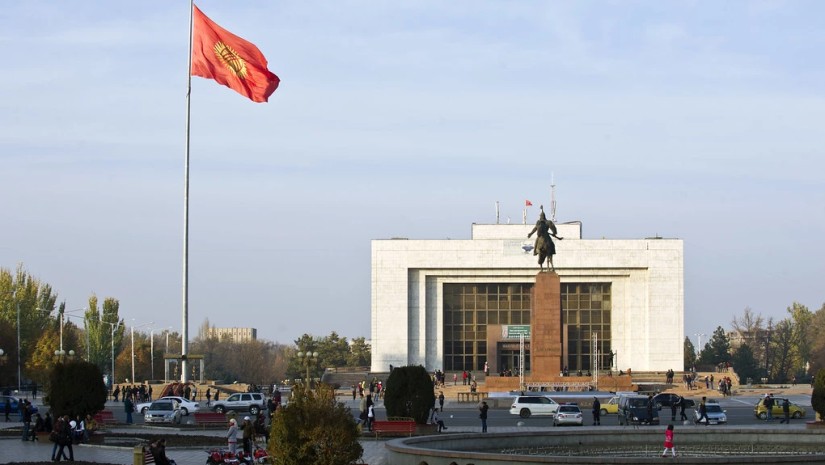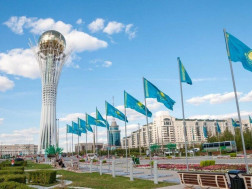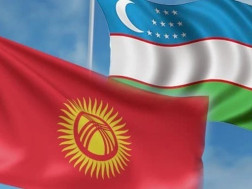While Kyrgyzstan has a stock exchange and a relatively open frontier market economy, the country still prominently displays a Vladimir Lenin statue in the capital city’s main square.
Kyrgyzstan ranks as a smaller but strategically significant player in Central Asia. It is known for its natural beauty, relative political openness, and cultural diversity but faces challenges in economic development and infrastructure compared to regional leaders like Kazakhstan and Uzbekistan.
Both Georgia and Kyrgyzstan are small but beautiful countries and as per latest trade data; Georgia's Main Trade Partner Is Kyrgyzstan With USD 1 BLN Market value.
The Kyrgyz som is the official currency of Kyrgyzstan (the Kyrgyz Republic) and is currently trading around 86 levels against The US dollar. The Asian Development Bank (ADB) recently raised around $5mn from its first-ever bond issued in Kyrgyzstan’s currency, the Kyrgyzstani Som (KGS). The three-year issue, carrying a 10.5% coupon, was denominated in KGS and settled in USD. It was Arranged by Standard Chartered Bank and fully subscribed.
Kyrgyzstan is considered a mid-tier country within Central Asia based on various rankings and indicators.
Kyrgyzstan offers several investment opportunities, driven by its natural resources, strategic location, and evolving market dynamics.
Kyrgyzstan has one of the smaller economies in Central Asia, with a GDP significantly lower than Kazakhstan and Uzbekistan but ahead of Tajikistan. Kyrgyzstan has limited regional influence compared to Kazakhstan and Uzbekistan, which are economic and geopolitical leaders in Central Asia.
Kyrgyzstan's economy is relatively small on the global scale. In nominal terms, its GDP is projected to reach approximately $14.9 billion, ranking it among the lower tiers globally, likely around 140th to 150th place depending on the measurement source
Kyrgyzstan's per capita GDP in nominal terms is about $1,263, which reflects its status as a lower-middle-income country. When adjusted for PPP, the figure rises to $6,402 per capita, indicating better living standards in capital city of Bishkek relative to its nominal income
The Kyrgyz Stock Exchange is a small but evolving platform within Kyrgyzstan's financial landscape. It holds potential for growth through privatization, regulatory reform, and regional cooperation but faces significant challenges, particularly in attracting liquidity and investor interest. For investors, the KSE offers an early-stage market with high-risk, high-reward opportunities.
The Kyrgyz Stock Exchange (KSE) currently lists 37 companies. These include only domestic issuers in the securities sector, with no foreign securities listed as of the latest update
Some of the largest and most notable companies in Kyrgyzstan include:
Kumtor Gold Company - A major gold mining operation and one of the country's key economic contributors. It manages one of the largest gold deposits in Central Asia.
MegaCom - One of the largest telecommunications providers in Kyrgyzstan, offering mobile and internet services.
Aiyl Bank - A significant player in the banking sector, focusing on agriculture and rural development financing.
Kyrgyz Railways - The state-owned operator responsible for the country's rail transport infrastructure.
National Bank of the Kyrgyz Republic - While primarily a regulatory institution, it plays a significant role in the economy and financial sector.
Kyrgyzaltyn - A state-run enterprise focused on gold production and mining investments
Kyrgyzstan economic advantages & opportunities
- Resource-Rich Economy
Gold Mining: Kyrgyzstan has significant gold reserves, with the Kumtor Gold Mine being a flagship project contributing substantially to GDP. Mining laws are becoming more transparent, creating opportunities for foreign investors.
Other Minerals: Deposits of coal, rare earth elements, and uranium offer additional prospects.
Hydropower Potential: Kyrgyzstan's mountainous terrain gives it one of the largest untapped hydropower potentials in Central Asia, suitable for renewable energy investments.
- Strategic Location
Situated at the crossroads of China’s Belt and Road Initiative (BRI), Kyrgyzstan can serve as a logistics hub for trade routes connecting Europe, China, and South Asia.
Proximity to large markets like China and Kazakhstan provides access to regional trade networks.
- Growing Sectors
Agriculture: Fertile land and water resources make Kyrgyzstan a viable destination for agribusiness investments, particularly in organic farming and exports.
Tourism: The country is leveraging its natural beauty (e.g., Issyk-Kul Lake, Tien Shan Mountains) to attract eco-tourists and adventure travellers.
Textile and Manufacturing: Growing textile and garment sectors aim to capitalize on cost-competitive labour and access to Eurasian Economic Union (EAEU) markets.
- Favourable Investment Climate
Member of the EAEU, providing duty-free access to a market of over 180 million people.
Simplified taxation system and improved legal frameworks for foreign investors.
Government incentives for investments in priority sectors like renewable energy, IT, and agriculture.
- Young, Educated Workforce
Over 30% of the population is under 30 years old, providing a trainable and cost-efficient labour force.
Initiatives in digital literacy and IT education are growing the tech talent pool.
The Kyrgyz Stock Exchange (KSE) is the primary securities exchange in Kyrgyzstan, playing a crucial role in the country’s capital market development.
Established: 1994, as part of Kyrgyzstan’s transition to a market economy following independence from the Soviet Union.
Regulator: Governed by the State Service for Financial Market Regulation and Supervision.
Headquarters: Bishkek, the capital of Kyrgyzstan.
Market Structure
The exchange primarily facilitates trading in stocks, bonds, and other financial instruments.
It has a modest number of listed companies, reflecting the small and developing nature of Kyrgyzstan’s economy.
Trading volumes are relatively low compared to other regional exchanges, and activity is limited.
Recent Developments
Efforts are underway to modernize and digitize the exchange's operations.
The government is encouraging state-owned enterprises to list on the exchange to boost liquidity and market participation.
Integration with regional markets, particularly through the Eurasian Economic Union (EAEU), is being explored.
Kyrgyzstan stock market Challenges
Low Market Capitalization: A small number of listed companies and limited investor base restrict market growth.
Liquidity Issues: Low trading volumes deter foreign investors.
Awareness: Public knowledge about capital markets and their benefits remains low.
Economic Constraints: Kyrgyzstan’s economy, while growing, is still developing, which limits the scale of domestic financial markets.
Opportunities
Privatization: Planned government-led privatization of state assets could stimulate market activity.
Foreign Investment: Efforts to improve transparency and regulatory frameworks aim to attract international investors.
Regional Trade: Participation in EAEU financial initiatives could provide growth opportunities.
Kyrgyzstan economy Key Challenges
Political Instability: Recent political transitions and social unrest create risks for long-term investments.
Corruption: Transparency issues and bureaucratic inefficiencies can complicate business operations.
Infrastructure: While improving, roads, and transportation networks still require significant investment.
Dependence on Gold: The economy heavily relies on the gold sector, exposing it to commodity price fluctuations.
Conclusion
Kyrgyzstan presents a compelling investment case for those frontier market investors willing to navigate its risks. Opportunities in mining, hydropower, agriculture, and tourism are especially strong, supported by an improving regulatory environment and regional trade connectivity. Mitigating risks through local partnerships and a strong understanding of the legal and political landscape is crucial for success. This article does not constitute financial, legal, or investment advice.
Investors are strongly advised to conduct thorough due diligence, seek local expertise, and consult with financial and legal professionals to understand and mitigate any investment risks. Past performance is not indicative of future results, and investments in Kyrgyzstan may not be suitable for all investors.
Rainer Michael Preiss, Partner & Portfolio Strategist at Das Family Office in Singapore
















